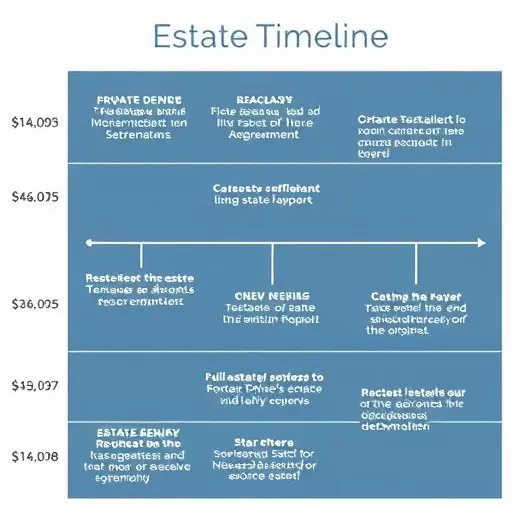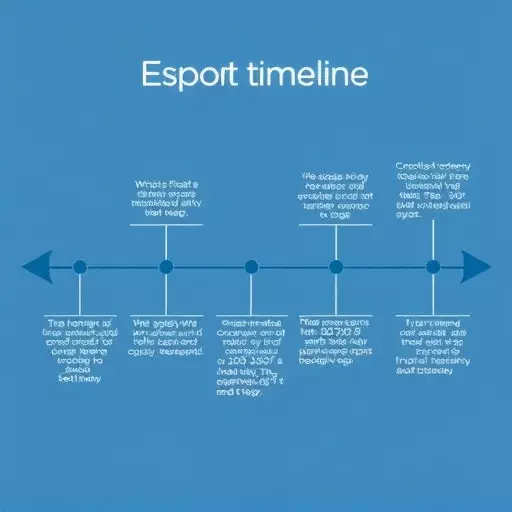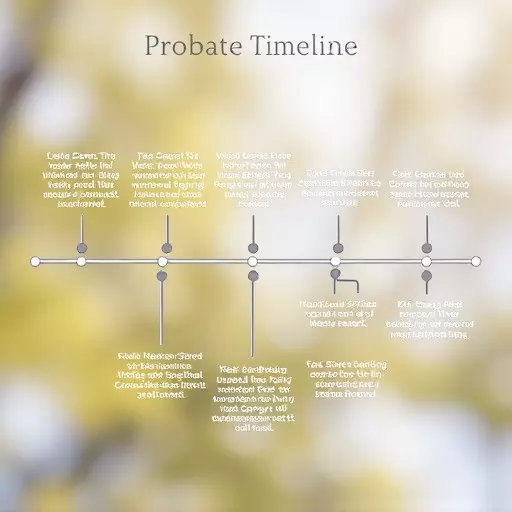A small estate probate in Palo Alto, California, typically takes 6-12 months, divided into three main stages: initial appointment & document gathering (1-2 months), asset identification, collection, debt/tax payment, and tax return preparation (3-6 months), and distribution of remaining assets to beneficiaries (1-3 months). Complex cases with contested wills or significant assets may take years. Timely actions by the executor, clear communication, and prompt court processing can expedite the process, while missed deadlines, legal disputes, or beneficiary indecisiveness cause delays. Understanding the probate timeline is crucial for managing expectations during this stressful period.
- Understanding the Probate Process: An Overview of Key Stages
- Average Duration for Each Probate Timeline Phase
- Factors Affecting the Estate Settlement Timeframe
- Efficient Estate Administration: Tips from Probate Experts in Palo Alto, CA
Understanding the Probate Process: An Overview of Key Stages

The probate process, governed by state laws, facilitates the safe transfer of assets from a deceased individual’s name to their named beneficiaries. It involves several key stages that an expert Palo Alto, California probate attorney can guide you through. Initially, there’s the filing of a death certificate and petition for probate with the court, triggering the official opening of the estate. This is followed by the appointment of an executor or personal representative, who manages the estate and administers the will’s provisions.
Next comes identifying and valuing all assets, including real estate, financial accounts, and personal belongings. The executor prepares a detailed inventory and ensures timely filing of tax returns. Creditors then have a period to file claims against the estate, which are evaluated by the executor. Once debts are settled or disputed, the remaining assets are distributed according to the will’s instructions, concluding the estate settlement process.
Average Duration for Each Probate Timeline Phase

The average duration for each phase of a small estate probate can vary depending on several factors, including the complexity of the estate, the number of beneficiaries, and the efficiency of all involved parties. In general, however, experts in Palo Alto, California, have observed that the entire estate settlement process typically takes around 6 to 12 months from start to finish.
The initial phase, which involves the appointment of a personal representative (often called a “executor” or “administrator”) and the gathering of necessary documents, usually lasts about 1-2 months. The next stage, where the personal representative identifies and collects assets, pays debts and taxes, and prepares tax returns, can span from 3 to 6 months. Finally, the distribution of the remaining assets to beneficiaries typically concludes the process within the last 1-3 months. Each step may be influenced by legal requirements, court procedures, and the need for professional advice, all of which contribute to the overall timeline duration.
Factors Affecting the Estate Settlement Timeframe

The duration of a small estate probate can vary widely due to several factors. In California, especially in areas like Palo Alto, an expert understanding of the probate timeline is crucial. One of the primary influences on the estate settlement process is the complexity of the will and the asset distribution. Simplest cases with straightforward wills and minimal assets tend to settle faster, often within a few months. Conversely, complex estates with contested wills, numerous beneficiaries, or significant assets may take considerably longer, sometimes stretching into years.
Another key factor is the responsiveness of all involved parties. Timely actions by the executor, clear communication among beneficiaries, and prompt court processing can expedite the timeline. Conversely, delays caused by missed deadlines, legal disputes, or beneficiary indecisiveness can significantly prolong the estate settlement process. Understanding these variables helps in managing expectations during what can be a stressful period for families.
Efficient Estate Administration: Tips from Probate Experts in Palo Alto, CA

In Palo Alto, CA, probate experts stress the importance of an efficient estate administration process to ensure a smooth transition for all involved parties. The probate timeline typically includes several distinct stages: initial filing and notification, gathering and valuing assets, distribution of assets to beneficiaries, and final account settlement. Each stage requires meticulous attention to detail and adherence to legal requirements.
Experts recommend proactive measures like organizing important documents in advance, maintaining accurate financial records throughout the process, and fostering open communication between all parties involved. These practices not only streamline the estate settlement process but also help reduce potential disputes or delays. By understanding the probate timeline stages and seeking guidance from experienced professionals in Palo Alto, CA, individuals can navigate the complex process with greater confidence and efficiency.


